Anna Schmitt Funke Art conservator and translator
Hi, I’m Anna and I live in Berlin with my husband, daughter, dog and two cats. My first career was as an art conservator but now my love of books and publishing has caught up with me. Recently I have been translating my Mum’s books into English as well as doing some editing work. If you are interested in having your German novel translated into English you can contact me under anna.schmittfunke@gmail.com or through my Instagram account.
We had this interview with Anna in 2024.
Instagram Website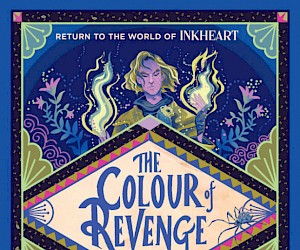
You are Cornelia’s daughter and in 2022 you’ve started to translate her books into English. How come?
We had just left the US and moved to Europe and I hadn’t started working again so was looking for something to do. I knew in the back of my mind it was probably time for a career change for me (I had worked as an art conservator up until that point) and I knew Cornelia’s British publisher was looking for a new translator to work on The Colour of Revenge so I decided to submit a sample.
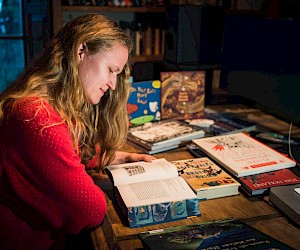
Photo: Michael Orth
What are the biggest problems and challenges you encounter as a translator?
I think matching the author’s tone is always a challenge as a lot of it is conveyed through subtext. But when translating German into English specifically, I think humor poses a really interesting challenge. Humour in German — or at least in Cornelia’s writing — is often heavily language based and can be very difficult to capture in English.
Is it easier for you to translate German into English or vice versa?
Definitely German into English.
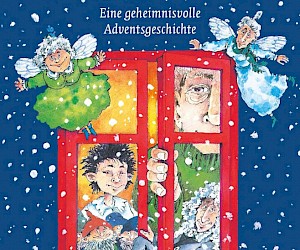
Is there a particular book written by Cornelia you think that should be published in English?
I think a lot of her backlist could be very interesting. In fact we are working on updating Behind Enchanted Windows right now, which is a real classic in Germany, but has never been published in English.
You spent your child years in Germany, but then in 2005, when you were 16, you and your family moved to the US. Later you studied and worked in England. For some time now you have lived in Berlin. Which is the language you’re dreaming in? And would you say that one of the two languages is closer to you?
I usually say that German is my native language, but English is my first language. Because all my higher education and working life took place in English I am much more adapt at expressing complex thoughts in that language. I also speak English at home with my husband, so it keeps the language at the forefront of my mind even though we live in Berlin. But my spoken German has definitely improved again since we moved here. I don’t think my preference of English is necessarily a result of any specific features of the language and more a result of my experience with it, the people who are only in my life because I speak that language.
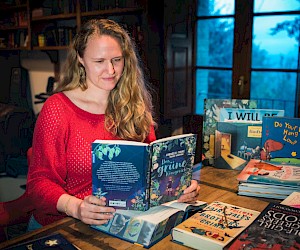
You can’t really separate language from culture on the one hand and personal experience on the other. Sometimes, I guess, meaning therefore is not so easy to translate. What is your way of dealing with it?
When a scene doesn’t really translate culturally — let’s say it’s about Nikolaus, a pre-Christmas tradition that doesn’t exist in the English speaking world — I think it’s usually best to just add a small explanation so the English speaking reader can still follow the plot. If it’s something really minor, depending on the context, sometimes it’s also okay to just change it. But I think that would have to be the author’s decision.
Has translating brought you closer to German again? Have you become more acquainted with it?
Yes definitely. I hadn’t really read any German in many years so it really made me refamiliarize myself with the written language.
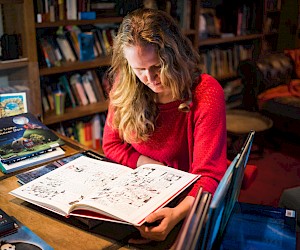
Photo: Michael Orth
Are there moments when you feel uncertain which word or expression is most suitable? And if so, what do you do?
Absolutely. Online dictionaries are a huge help of course. But sometimes I’ll just put down the best word I can think of and highlight it in the text to come back to later. Usually I’ll think of a better word or come across a useful expression somewhere and then I change it later on.
While translating, how closely do you work together with Cornelia? And are you in touch with the the editors as well?
Surprisingly enough we actually don’t work together all that closely during the translation process. Usually I will translate the entire book and go over it at least once before she reads it. I might have minor questions in between but it honestly isn't much usually. Then when she reads she’ll make her own changes but generally that’s not really a back and forth. I usually work much more with the publishers’ editors. They will usually do several rounds of edits and in the case of a translated book it is actually the translator, not the author, who goes over those edits and approve changes. This is the stage where I usually work the closest with Cornelia as well to make sure that she is okay with the changes suggested by the publisher.
What does translation mean to you?
I think a good translation reads as if it was written in that language with maybe just a hint of the foreign left behind. I know people have different views on this and there are strong arguments to be made for both, but I think it makes for the best reading experience.
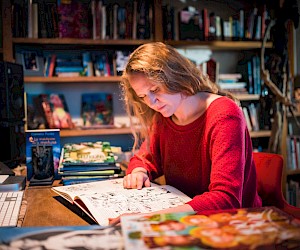
Photo: Michael Orth
How do you proceed? Is there a royal road?
I usually do it chapter by chapter. So I’ll read the chapter and then translate it. It keeps me more invested in the story as I move along than when I read the whole book first (although I have often read the books in their entirety at some point in the past). During my first draft I usually try to stick as close to the German as possible. This usually means finding all the right terms and the original flow of the language. In my next draft I’ll then focus on making it sound English by working on the grammatical structure and anything that sounds a little awkward or too German. I also like to use dictation a lot when I translate. I think it makes it easier to get the flow of the language just right.
How long does it take to translate one page?
Roughly fifteen minutes to an hour for a first draft for me. Later edits are a bit tricky to account for in that. I will often use dictation when I translate and that can make things go a little faster as well.
Do you like dealing with language?
I do like it. It is something you can entirely control with your mind rather than relying on hand skills (as I did in conservation), or even technology or other people.
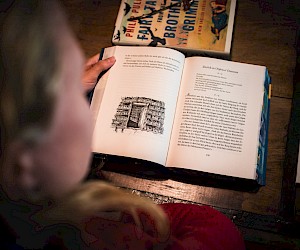
Photo: Michael Orth
Do you always approve Cornelia’s writing or do you sometimes come across passages which make you roll your eyes?
IF there is ever a stylistic choice that would make me roll my eyes I would never give feedback on that or change it in the translation, because not only is Cornelia’s style well beloved, it is also an entirely personal preference. Just because I would not use an expression doesn’t mean it shouldn’t be used. I try to focus my feedback on a general reader experience rather than on my own personal preferences, although of course sometimes they are difficult to separate.
How much do your work and you personally shine through in the stories you translated?
I don’t think my translation would affect the way a reader would feel about a character, and I certainly would never want a translation of mine to have that effect. I think it is important to keep your feelings about characters and plot points out of a translation as much as possible. Where the translator’s voice tends to shine through is in the flow of the language. For example I tend to express myself more briefly, maybe more staccato than Cornelia when I write and I am sure that is reflected in the translation at times even though it wouldn’t be intentional.
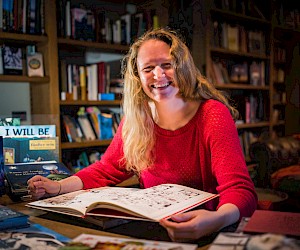
Photo: Michael Orth
Can you imagine writing your own stories yourself one day?
Maybe one day :)